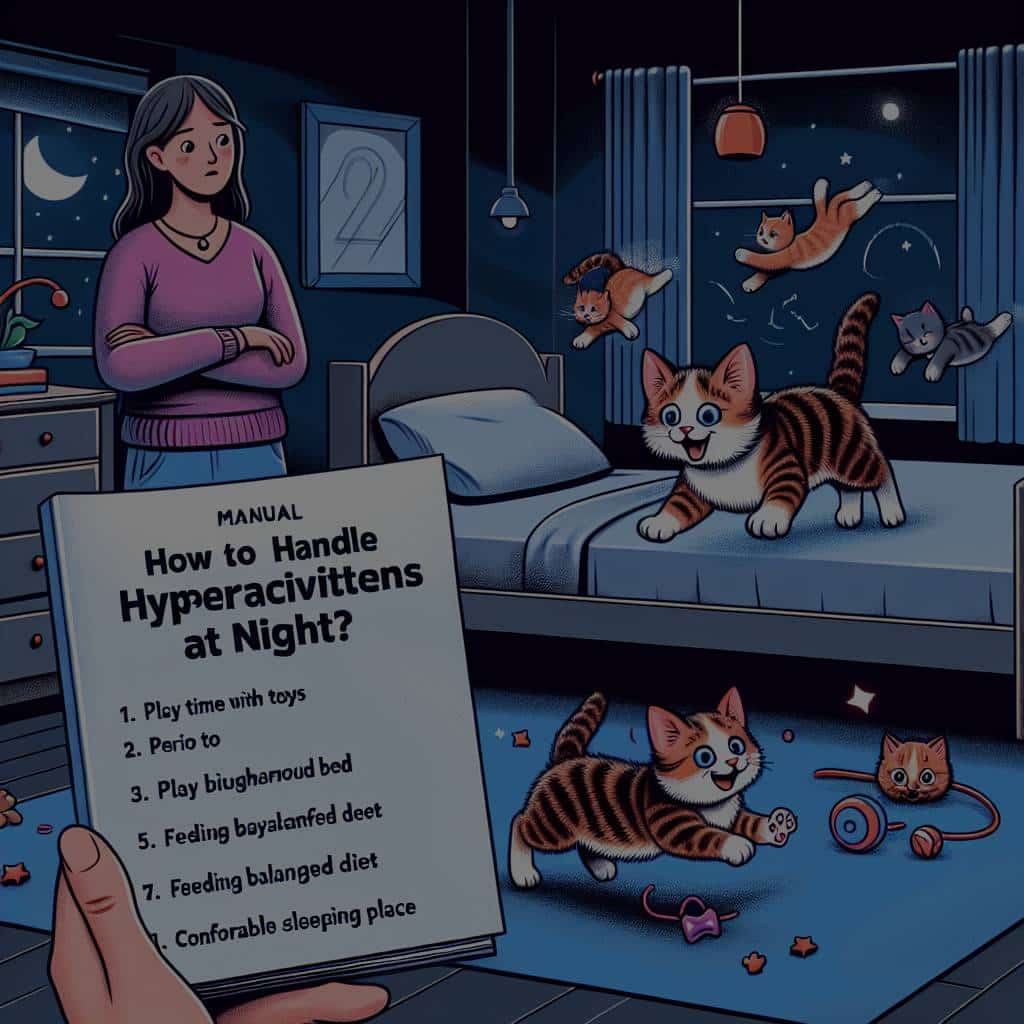How to Address Nighttime Hyperactivity in Young Cats?

Are your kittens exhibiting hyperactive behavior during the nighttime? Does their unlimited energy keep you awake? If you are experiencing these challenges, you are not alone. Many cat owners struggle to understand why their feline friends become active at night, and how they can help manage such behavior. This article will provide an in-depth exploration of the reasons behind nighttime hyperactivity in young cats and offer practical solutions to help establish a calm and more manageable routine.
Understanding Your Cat’s Nighttime Behavior
Before diving into combatting nighttime hyperactivity, it is essential to understand why your cats may be more active during the night. After all, understanding is the first step in finding solutions.
Also to read : How to Identify and Treat Common Eye Problems in Senior Cats?
Cats, particularly young ones, are often more active at night. This nocturnal behavior is a natural instinct, and not a sign of any problem. In the wild, cats hunt during the night when their prey is most active. Although domesticated cats have had their basic needs met by humans, they retain some of these instinctual behaviors, and their peak activity periods often fall during twilight and dawn.
Kittens and young cats have even more energy to burn, and they often do so in the form of zoomies, or sudden bursts of energy that result in racing around the house, jumping off walls, and playing with toys. During these times, you may observe that your kitten is almost unstoppable. This is because kittens are in the prime stages of developing their hunting and survival skills, and play is a vital part of that process.
This might interest you : What Are the Best Strategies for Keeping an Active Dog Entertained Indoors?
How Daytime Activities Influence Nighttime Behavior
The activities your cats engage in during the day can significantly influence their nighttime behavior. If your cats sleep all day, they are more likely to be active at night.
While it is perfectly normal for cats to sleep for long periods during the day (they are crepuscular, which means they are most active during the twilight hours of dawn and dusk), excessive daytime sleep could result in nighttime hyperactivity. If cats do not receive enough stimulation during the day, they will use their stored energy at night when the house is quiet, and realize it is a perfect time to play.
It’s important to provide your cats with enough physical and mental stimulation during the day. This can be done through play and the use of toys that stimulate their hunting instincts. Interactive toys, puzzle feeders, and regular play sessions will help keep their minds active and bodies tired.
Techniques to Calm Your Cat at Night
Now that we have understood the reasons behind your cat’s nighttime hyperactivity, let’s explore some practical techniques to help establish a calmer nighttime routine.
First, aim to adjust your cat’s sleep-wake cycle. Although cats are naturally crepuscular, they can adjust their sleep cycles to match their owners’ with a bit of persistence. Keep them awake and active during the day as much as possible. Engage them in play, and try to tire them out before bedtime.
Another effective technique can be to feed your cats their main meal just before your bedtime. Cats’ natural cycle is to hunt, eat, groom, and then sleep. Therefore, a full belly can help induce sleepiness.
How Environmental Adjustments Can Help
Sometimes, making some necessary adjustments in your cat’s environment can also help in mitigating nighttime hyperactivity.
For instance, providing a quiet and dark place for your cat to sleep can make a significant difference. Cats are more sensitive to light than humans, so even the slightest change in lighting can keep them awake. Consider installing blackout curtains in the room where your cat sleeps to help create a conducive environment.
Additionally, too much noise can also disturb your cat’s sleep. Try to keep the noise levels down in your home during the night. If you live in a noisy neighborhood, consider using white noise machines or fans to help drown out the external noise.
In essence, understanding your cat’s natural instincts and adjusting their environment and routine accordingly can help manage nighttime hyperactivity. It’s all about finding the right balance that works for you and your feline friend.
Dealing With Growths and Developmental Milestones
As we’ve pointed out, your kitten’s nighttime behavior is perfectly normal. The zoomies are just part of kittens developing their hunting and survival skills. This is important to remember when you’re dealing with a hyper kitten who seems to have boundless energy at night. However, this doesn’t mean that you have to resign yourself to sleepless nights.
Many owners find that their kittens’ behavior changes as they grow older. The developmental milestones that cats go through can have a significant effect on their behavior. During their first year, kittens are learning and growing at a rapid pace. They’re developing their motor skills, learning how to hunt, and figuring out their social skills. This is often when you’ll see the most hyperactivity and playfulness.
However, as they grow older and pass the one-year mark, many cats start to calm down. They’ve mastered most of their hunting skills and don’t need to practice as much. They also start to establish their territories and become more confident in their environment. This can lead to a decrease in nighttime hyperactivity.
Of course, every cat is different, and some may continue to be active at night well into their adult years. If your cat’s nighttime behavior is causing problems, it may be a good idea to consult a veterinarian. They can rule out any potential health issues and may be able to provide additional advice on managing your cat’s behavior.
Conclusion: The Balancing Act of Managing Your Cat’s Nighttime Behavior
Ultimately, managing your cat’s nighttime hyperactivity is a balancing act. It involves understanding your cat’s behavior, being patient with your feline friend, and making necessary adjustments to their routine and environment. Remember, your cat’s instincts to be active at night are perfectly normal. They’re not being deliberately disruptive – they’re just being cats.
Keeping your cat engaged during the day can help to reduce their nighttime hyperactivity. Provide them with plenty of interactive toys and stimulation to keep their minds active and help them burn off energy. Adjusting their sleep-wake cycle to match yours and feeding them just before bed can also help to promote a more peaceful night’s sleep for both of you.
If you are still struggling with your cat’s nighttime behavior, don’t hesitate to consult a veterinarian. They can provide advice tailored to your specific situation and might be able to offer further suggestions for managing nighttime hyperactivity.
Remember, the goal isn’t to completely eliminate your cat’s natural instincts, but rather to find a balance that works for both you and your cat. After all, part of the joy of having a cat is learning to understand and appreciate their unique behaviors and quirks.
The road to a peaceful night’s sleep might be a bit bumpy, but with patience, understanding, and a bit of creativity, it’s a journey that can lead to a deeper bond between you and your feline friend.
